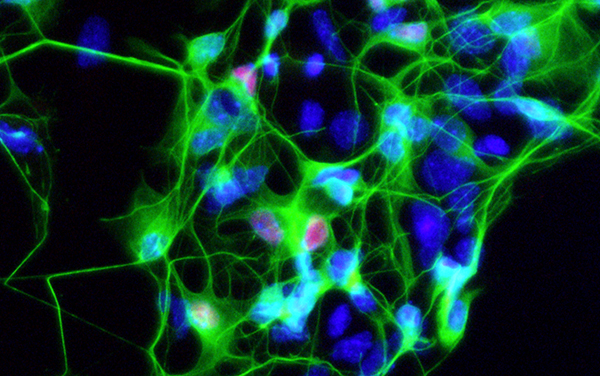
Ten percent of all patients with two neurodegenerative diseases — frontotemperal dementia (FTD) and amyotrophic lateral sclerosis (ALS), also known as Lou Gehrig’s disease — possess a mutation in the same gene. Justin Ichida, assistant professor of Stem Cell Biology and Regenerative Medicine, has received a Muscular Dystrophy Association (MDA) research grant totaling $300,000 over three years to determine how this mutated gene contributes to ALS.
To study this, Ichida’s lab will use “cellular reprogramming” to transform the blood cells of ALS patients with the mutation into motor nerve cells in a Petri dish. Because the mutated gene contains faulty instructions for producing a protein called C9ORF72, these cells are expected to degenerate in the protein’s absence. Ichida hopes to rescue the cells by exposing the cells to a normal level of the protein, and to reveal the mechanism that allows the protein to protect motor nerve cells.
“This work will establish C9ORF72 protein as a key therapeutic target for ALS patients,” said Ichida. “I’m grateful to the Muscular Dystrophy Association for its commitment to helping patients with a wide range of neuromuscular diseases, including ALS.”
A leading nonprofit health agency dedicated to saving and improving the lives of people with muscle disease, MDA funds worldwide research to find treatments and cures, provides comprehensive health care services and support to MDA families nationwide, and rallies communities to fight back through advocacy, fundraising and local engagement.
MDA awarded a total of $10 million in new research grants to scientists conducting leading-edge discovery for muscular dystrophy, ALS and related muscle-debilitating diseases. This round of research grants was approved by MDA’s Board of Directors after analysis by MDA’s Medical and Scientific Advisory Committees, comprised of leading clinicians and scientists, who oversee the peer-reviewed process on a volunteer basis.
MDA received 350 grant requests, the most ever in its 65-year history of funding basic, translational and clinical research. It awarded grants to 36 researchers, half new to MDA.
“These new grants are potential game-changers, a signal of our passionate resolve to help kids and adults fighting neuromuscular diseases live longer and grow stronger,” said Valerie Cwik, MDA’s executive vice president and chief medical & scientific officer. “There’s more new drug discovery underway than ever before, and we’re determined to double the number of promising human clinical trials in the next five years.”
MDA’s long-term investment in research has contributed to more than 30 clinical trials in the past year alone for novel drugs and other therapies aimed at treating a broad spectrum of neuromuscular diseases. This year, MDA is funding 250 different research projects in 16 countries.
“We’re supporting the best of the best, thanks to generous sponsors and supporters who champion our work,” Cwik said. “Advancements can’t come soon enough.”
